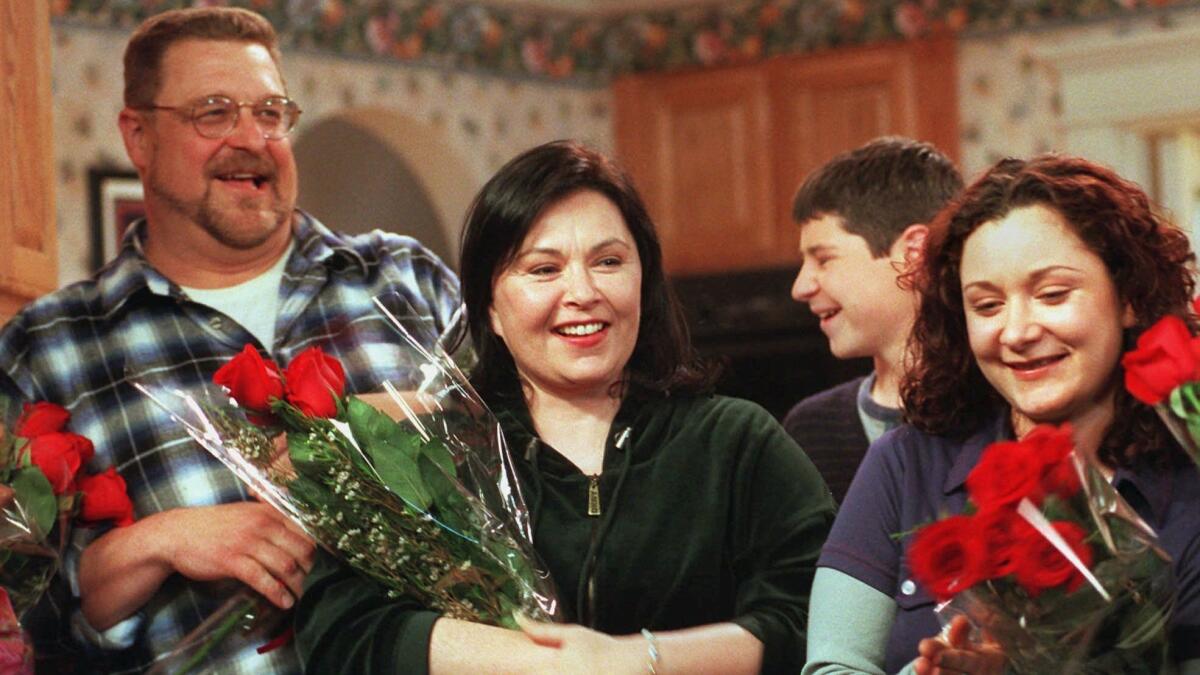From the Archives: As ‘Roseanne’ clocks out, it’s the class that matters

- Share via
Editors note: “Roseanne” has returned to ABC after a 20-year hiatus. How does the new show measure up to the old one, and how will a sitcom featuring a white, working-class family resonate in the Trump era? Pulled from the Los Angeles Times archives, here is a 1997 review of the original “Roseanne.”
A good sitcom is funny; a great one earns your respect and attention even when it’s not funny. For years, ABC’s “Roseanne” cut it in both categories.
At the very least, it tops all of TV’s distinctively blue-collar comedies.
Even that NBC antique, “The Life of Riley,” where William Bendix’s lunch pail became an extension of his arm in the 1950s? Get real.
Even Fox’s outgoing “Married ... With Children”? Are you kidding? The Bundys wouldn’t know a plant whistle from a screaming teapot.
Even Fox’s genius cartoon, “The Simpsons”? Don’t go there. IQ, not social class or workplace, is what indelibly stamps Homer.
Even revolutionary “All in the Family”? Bite your tongue. The entrenched bigotry and ignorance that defined Archie Bunker on CBS in the 1970s transcended economic strata, even though the messenger in this case punched in a time card.
‘ROSEANNE’ REVIEW: Roseanne Barr and cast reunite for an update on the iconic sitcom »
And Brett Butler’s “Grace Under Fire”? Definitely another worthy blue-collar candidate from ABC, but still a callow work-in-progress after a mere four seasons, compared with the nine stretching “Roseanne’s” swollen belt line as it departs first-run TV with a double-sized finale on Tuesday.
ABC has made available only the first half-hour of this sentimental final episode, which finds the show’s entire boisterous extended family filling the Conners’ tract house and Roseanne and Dan (John Goodman) sipping wistfully on matrimonial memories.
The homestead is again bustling and undergoing dramatic change. The Conners’ youngest daughter, Darlene (Sara Gilbert), is moving in with her husband and 2-month-old daughter, relegating the Conners’ teen son, D.J. (Michael Fishman), to the basement. And their oldest daughter, Becky (Sarah Chalke), and her husband have a secret.
The house bulges, but not the story line, offering only a bit to laugh at.
Dan: “We’ve raised some independent, free-spirited individuals.”
Roseanne: “What the devil were we thinkin’?”
Otherwise, well, you admire the strong familial ethic articulated here in a reunion so overripe with massaged nostalgia that you half expect Charles Kuralt to walk in with a camera crew and start taping. Based on this half-hour sample, however, “Roseanne” is following the tradition of some other notable sitcoms (the fabulous “MASH” is one of them) in appearing to ride out to pasture with more windiness than trademark wisecracks.
Wisecracks from Roseanne, in fact, that through the years gave this character a kind of dark, edgy cynicism that separated her from the sitcom matriarchs who preceded her. She was their antichrist, instinctively throwing around her weight (which varied from season to season), aiming caustic one-liners even at her family and trampling the holy ground of Donna Reed and other TV moms and comedy heroines memorable for their fairness, good humor, infinite patience and personal tidiness.
Because it was so popular in its heyday, shooting to the top of the Nielsen ratings, “Roseanne” was enormously influential, changing the way viewers regarded sitcom families and their relationship to the world they portrayed. Who was this rebel who, in an act of utter sitcom defiance, even kept a messy house?
What the devil was she thinkin’?
If the series at times seemed grim and gave the impression that its star was using her TV character to exorcise her personal demons, that was excusable, for laughter was never entirely what “Roseanne” was about.
Working-class through and through, it artfully and sensitively mirrored a segment of society whose full range of emotions had previously been excluded from TV comedies. “Roseanne” never softened edges. Although Dan and Roseanne had flaws the size of potholes, they were defined mostly by their strengths and resilience, surviving both money droughts and the plague of windfall wealth, as well as the usual calamities that tear at families.
“Roseanne” didn’t shrink from confronting the dicey issues facing parents in the real world, from raising, advising and making up with kids who want to disown you to raising money. When the nation’s economy caved, moreover, so did the Conners’, slamming into the ground with a heavy thud that resonated the anxieties of millions of middle-class Americans living from paycheck to paycheck. And although far from being the bitingly funny series it once was, “Roseanne” still proudly wears the dirt under its fingernails like a chest full of service ribbons.
A bit of a pain she may be. But you have to give it to Roseanne the artist. For all her storied exotic behavior during her weird Tom Arnold period and her eccentricity, shrillness and even nastiness, she has put on a helluva TV show with help from Goodman and the rest of her cast, the Carsey-Werner Co. and various writers, producers and other right arms that she has amputated from the series over the years.
It was Roseanne’s stunning success that swung open doors to a multitude of wannabes, stand-up comics who began swarming prime time with their names emblazed above their own sitcoms. Yet she was one of only a few who proved worthy, both commercially and creatively. Her series, which began as an extension of her comedy act, matured into an extension of working-class America.
More to Read
The complete guide to home viewing
Get Screen Gab for everything about the TV shows and streaming movies everyone’s talking about.
You may occasionally receive promotional content from the Los Angeles Times.






